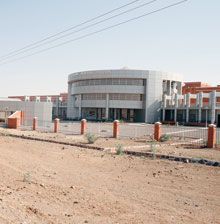Botswana on road to achieving health-for-all
THATO CHWAANE
Staff Writer
| Friday June 6, 2008 00:00


NAB executive secretary Geetha Feringa said that Botswana has committed itself to Primary Health Care (PHC) strategy for the attainment of health-for-all. She said that Botswana has set criteria of having a health facility within 15km of a settlement.
She was speaking as NAB prepares to celebrate Nurses Day on June 12, on the theme: Delivering quality, serving communities: Nurses leading Primary Health Care.
She said PHC depends on the nurse as the first contact with the community. She however wondered how they could provide quality care when they remain few on the ground.
Feringa said in developed countries the nurse to population ratio is 9-12 per 1,000. She said in Botswana the ratio is 3.5 nurses to a 1,000 and added that other under developed states have far less than one to a 1,000. She said that is why nurses were recently agitated and disappointed when they were excluded from the scarce skills allowance announced by government.
The nurses, who petitioned government so they can benefit from the new scarce skills dispensation, are still awaiting feedback that they should have received by the end of last month.
With developed countries complaining about scarcity of nurses, our nurses are going there, she lamented. Feringa said that so far a small percentage of nurses - about seven percent - has migrated. She said that the nurses deserve better salaries and better working conditions. Feringa said nurses work far more than they should, as they are made to prescribe medication, take blood samples, do rapid tests for HIV and give ARVs, because their scope of work is not well defined. Our scope is unclear and the nurse-patient ratio is high, she added. She gave an example of a clinic where one nurse can see a hundred or more patients or where one nurse on night duty can be responsible for 60 patients in a ward, and there is shortage of equipment or medication.
Feringa said that some health workers also face workplace violence. She said an ongoing research suggests that 75 percent of health workers have experienced some kind of violence, mostly verbal abuse. She said they advocate quality environments, increase in training of nurses and a clear scope for nurses. She said they also want to lobby for an increase in health training institutions and would even lobby for distance education with the University of Botswana (UB).
